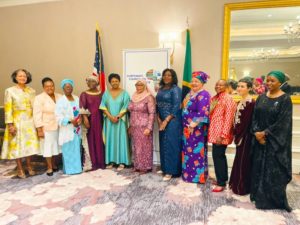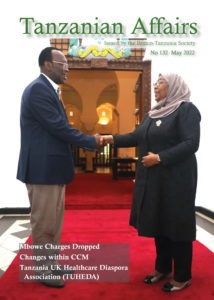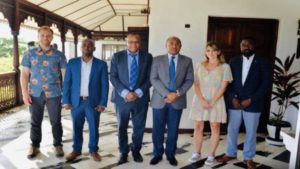by Ben Taylor

President Hassan at a dinner held in her honour in Washington DC, April 2022 (Ikulu)
.
As Tanzania saw the first anniversary of Samia Suluhu Hassan becoming President in March, the government and the ruling CCM party celebrated the economic and political changes her presidency has brought about.
Highlights of the year include the President’s championing of women’s rights. Nine of her cabinet ministers are women, which represents 36% of the cabinet, and she has brought a series of highly qualified women in to fill strategically important roles within State House. The government has also reversed the heavily criticised policy of banning pregnant schoolgirls from attending school.
Business environment and economic diplomacy
Just days after taking office a year earlier, President Hassan had outlined a raft of measures her government would take to stimulate economic growth, and to recover from the adverse effects of the global Covid-19 pandemic. In her maiden speech to Parliament she articulated the need for the government to regain investors’ confidence by creating a friendly business environment.
A year later, CCM Secretary-General Daniel Chongolo said the President’s efforts in this field have resulted in significant improvements in the business and investment environment. “In one year, we have seen a positive economic growth in our country as a result of increased investment in strategic projects: electricity, water, health, education, road construction, railways and airports,” he said.
Mr Chongolo noted that results that could already be seen including an increase in the circulation of cash, an increase in loans to the private sector, a reduction in bank’s bad credit, an increase in foreign currency reserves and increased tax collection to record levels.
Economists described the period as a course correction. Dr Abel Kinyondo of the University of Dar es Salaam said President Hassan was putting economic diplomacy into practice. She has done this, he explained, by undertaking crucial visits and meetings to repair ties with the outside world and influence Tanzania’s trading relationship with the rest of the globe. She has met with key players in the international economy – for example hosting visits by the former British prime minister Tony Blair, World Bank managing director Mari Pangestu and African Development Bank president Akinwumi Adesina, and by undertaking visits to Uganda, Kenya, Rwanda, Burundi, France, Belgium, the UK and the USA.
Prof Haji Semboja of the State University of Zanzibar’s Economics Department commended the President for understanding that Tanzania could not work as an island. “She has been believing in global connectivity and that is why she keeps on redefining policies, laws and policies to cope with this modern world,” he noted.
A second trip to the USA, in mid-April 2022, continued this strategy. President Hassan met with US Vice President Kamala Harris, holding talks that mainly centered on Tanzania’s economic growth. The trip reportedly generated close to a billion dollars in investments from various companies in the US.
“We welcome, of course the attention you are giving to that and the focus of this trip including the focus of investment opportunities in relation to the economy in the area of tourism,” said Vice President Harris.
The visit to the USA came exactly 60 years since Tanzania’s founding Father Julius Nyerere visited President John F Kennedy in 1962. In noting the anniversary, President Hassan said that “the United States and Tanzania have enjoyed relations for the last 60 years, my government would like to see the relations grow further and strengthened to greater heights.” She also expressed her government’s appreciation to the US government “for invaluable development assistance and great work the USAID has been doing in Tanzania over the years particularly on the social and economic development.”
Political freedoms
CCM Secretary General Daniel Chongolo also remarked that President Hassan has been committed to stabilising the political environment and bringing national unity through good governance based on the rule of law. He noted that she had met with opposition leaders, listening to their concerns and consulting with them on how best to protect democracy and freedom of expression.
He said during this one year, freedom of expression has improved. This is one of the key principles in promoting and building democracy and the classes of the people in self-government in the implementation of the 2020 election manifesto.
The President herself, speaking in mid-March, signalled further reforms would be forthcoming. She issued a series of directives to a special task force formed to propose reforms that would set the stage for “clean politics” and raising democratic standards. In addition to examining the possible need for constitutional reforms, she asked the task force to make recommendations on how best to handle subsidies to political parties, a general code of conduct for political parties, ending corruption during elections and finding a way to enhance women participation in politics.
“We need concrete recommendations that will be shared with the public so that people can understand where we want to go,” she said.
Dr Phidelis Rutayunga, a political analyst and lawyer based in Dar es Salaam, said President Hassan has showed genuine commitment to improving the political environment in the country. “I saw one quote that said she was ready to pay the cost in the 2025 General Election, but she is determined to create a level playing ground when it comes to politics,” he said.
“Speaking that way in a country like the United States shows that she is ready to be held responsible not only by politicians and pro-democracy activists in Tanzania but also abroad if there is no implementation,” he added.
Early 2022 saw three moments that signal a clear change of direction on political matters: the release of one opposition leader, Freeman Mbowe [see next article], a visit to another (Tundu Lissu) in his exile in Belgium in February 2022, and a willingness to discuss possible changes to political processes in Tanzania with opposition parties [see article on the Constitution]. The government has also recently ended bans on several newspapers, signalling a positive turn in media freedom.
Opposition leaders, however, see significant room for further changes. Two leading opposition parties – Chadema and NCCR – recently refused to participate in dialogue, arguing that the process made little sense if the government would not accept the need for a new constitution.
Further, beyond formal politics, civil society groups and the media continue to find that the operating environment remains challenging. While significant changes have been made, there remain strong elements within the government that are either unsure of the extent to which civil society and the media should be allowed to operate free from government control, or unwilling to allow this.
Changes within CCM
Early April also saw the President, in her role as CCM chairperson, introduce reforms to the CCM party rulebook. “Without building a quality and resilient political party, we will fail to keep up with the changes. So we are forced to make revisions within the party’s constitution to keep pace with the changes,” she explained.
The number of National Executive Council (NEC) and Central Committee (CC) members was slashed from 388 to 154, and 34 to 24, respectively. The party also halved the frequency of its annual internal meetings from the grassroots to national levels in what was said to be a decision meant to increase efficiency, and reduce the number of inactive leaders in various positions.
“We have returned regional secretaries to the National Executive Committee (NEC), who will receive direct instructions from the party organ instead of waiting directives from other committee members,” said the President.
Some of the new revisions to CCM’s constitution reversed changes which were made in 2017 under Magufuli, and were explained as being about improving the party’s efficiency.
University of Dar es Salaam (UDSM) lecturer, Dr Richard Mbunda, said the 2017 reforms were prompted by the austere philosophy of the Fifth Phase government. “Probably, the philosophy has been found to be unsustainable for the party, therefore triggering the new reforms,” he said.
A senior lecturer from the University of Iringa, Dr Stephen Kimondo, said despite references to the reforms as normal, the move to reinstate things dropped in 2017 implies that something was wrong within CCM. “It could be said that the amendments had been influenced by an individual,” he said, rather than what is best for the party.
At the same meeting of the party General Assembly, delegates unanimously voted in favour of the new party Vice Chairperson, Mr Abdulrahman Kinana. He replaces the outgoing Philip Mangula, who opted for retirement at the age of 81, after serving the party for many decades in many roles.



